Derek Thompson's Blog, page 20
September 26, 2013
Why the unknown is a writer's friend
 Get ready guys because the sun is coming...probably.
Get ready guys because the sun is coming...probably.Life is uncertainty. And I'm pretty certain about that. It's true for writing as well, of course.
Characters walk a tightrope that's fixed to idea at one end and completion at the other. Far below in those chasmy* depths lurk cliche, overworked allegory, formula and a host of other pitfalls.
Plots that start out as something of a romance-turned-sour can end up as terror or slapstick.
And hey, let's not forget what I call the Superwriting trilemma: Is it a bird (short story)? Is it a plane (novella)? No, it's Superwriting (novel)!
So, when you plan to write fiction, the only thing to be certain of is that very little is certain at the beginning. Later, as things progress, other uncertainties fill the spaces left behind.
Who do you show your work to?When do you show them your work?When (oh when) is the piece of writing good enough to merit 'The End'? (Which, incidentally, we never, ever write on a manuscript, only in a writing diary.)
See what I mean? Everywhere you turn there's a stack of unknowns, piled high on your plate like unclaimed waffles.
And that's a goodthing.
Here's why:
1. There's a prevailing attitude that anything can be learned by rote and then a winning formula can be repeated. Now, I have a keen interest in NLP and the effectiveness of modelling(the kind that doesn't require pouting and swimwear), but while we can model behaviours and techniques, that's no guarantee of a similar outcome. You may well improve the odds of a positive outcome, but that could be another result entirely.
2. Because life isinherently uncertain, embracing that philosophy not only gives you hope, it empowers you to try things others may have done, and even, perish the thought, things they tried and failed at.
3. As nothing is guaranteed except death and taxes (even for corporates, until a tax avoidance scheme is identified), you can try anything.
A case in point. My good friend Sue ran a successful Amazon giveaway and follow-up campaign. She gave away a fair few books and sold oodles afterwards. I, on the other hand, gave away 300 freebies and sold less than a dozen afterwards. Now, there may be many reasons why there was a difference:- Genre / niche- Tweet messages (twessages?)- The style of writing- The standard of writing- Mercury being retrograde (if I have to explain it, it won't be as funny)- The timing of the campaign and the time of day- Price (last, but never least)
So what do you do when things don't work out for you the way you planned? Simple. You do something else .
If there's a message here (and I think we're all hoping), it's that you write, you do whatever you feel is appropriate with your writing, and then you write something else.
Actually, I fibbed right at the beginning. There is another certainty beyond uncertainty and it's this: If you stop writing, you stop being a writer. Hand in your badge on the way out.
*chasmy is my new word of the week - neat, huh?
Published on September 26, 2013 03:28
September 19, 2013
What is a blog for? Over to you.
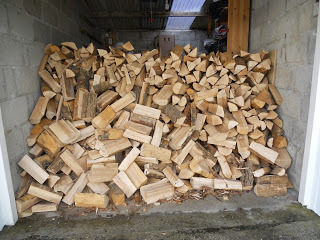 If blogs were logs and my computer were a garage.As some of you know, I recently experimented with a giveaway for my fantasy novel, Covenant. Around the same time, I decided I needed to review the way I use social media and evaluate what I give to it and what I get back in return.
If blogs were logs and my computer were a garage.As some of you know, I recently experimented with a giveaway for my fantasy novel, Covenant. Around the same time, I decided I needed to review the way I use social media and evaluate what I give to it and what I get back in return.Blogging has always been my favourite social media activity. I love the interaction between bloggers, and the generosity of those master bloggers out there who shares tips or who offer guest spots.
http://www.bubblecow.net/the-secret-of-earning-money-from-your-writing
http://masqueradecrew.blogspot.co.uk/2012/04/b-is-for-brainstorming-atozchallenge.html
I recently got some valuable blog feedback from Glen Long (via Jon Morrow) over at http://guestblogging.com/ and it got me thinking (some more).
He asked what the purpose of my blog was.
I made a list and it seems that the purpose is manifold:
- Promote my fiction?
- Sell my services as a writer / editor?
- Showcase my work?
- Engage with and entertain readers?
- Engage with and support other creatives?
- Make some money?
He suggested I make my headlines clearer and more dynamic. So, for example, based on the content, where I titled a recent post The beer essentials, he suggested I go with How to Use Action to Reveal Your Character's True Essence instead.
Glen also suggested I consider hosting a blog on my own domain.
Now, this is the bit where you come in.
It's a two-part quiz.
1. How do you see this blog and why do you visit (and by the way, thanks for coming)?
2. What is your blog for and does it fulfil your intent?
3. And for a bonus point, what's your experience of hosting your blog on your own domain - benefits and drawbacks, please?
As long as you're not selling pharmaceuticals, extensions (you know the kind), money-rich schemes, writing content farms, weaponry, porn or political / religious ideologies, you're welcome to include your blog link in with your answer and state - in one short sentence - what your blog is for.
Derek Thompson
Published on September 19, 2013 08:07
September 4, 2013
The beer essentials
One of the main ways I reveal character on the page is by letting my protagonists and antagonists do something. It can be a simple thing, a difficult thing, or a private thing. Sometimes it's the way they eat a sandwich and sometimes it's the way they stop a psychopath hitman who has a penchant for other people's watches. One time it was the way a character took a wizz. Heineken® has a new campaign takes that idea to extremes. They take men from all over the world and put them in unexpected and challenging travel situations, with minimal provisions and directions. when I say 'put', I mean 'dropped'. Imagine Challenege Anneka meets Appointment with Fear.The wily folk at Heineken® seek to answer the question: Are legends made or born. And, secondarily, what beer do they drink? (I'd give you a hint, but you can work it out for yourself.)‘Dropped’ is their series of episodic adventures. Just like the movies: an ordinary guy in an extraordinary situation. ‘Voyage’ is the fifth instalment, available on various platforms: broadcast, digital and mobile. There's also a Heineken® Dropped YouTube channel, where you can follow progress (or not!), add your own entries and potentially get the chance to have your own legendary travel adventure. What's clever here (and cleverly links back to my original point) is that each ‘Dropped’ adventure is personalised around the character of the protagonist - apparently it's also unscripted.So what can writers learn from this?- Engage readers beyond the boundaries of your book by offering extra media content.- Factor in a multimedia campaign and consider setting up your own Youtube channel, especially if you write a series.- Give your characters challenges that are specific to who they are and where they find themselves.- And whatever you do, watch out for clowns.
Published on September 04, 2013 15:28
August 29, 2013
On the campaign trail
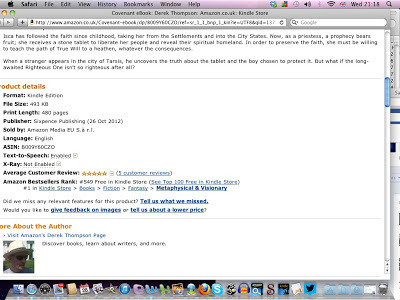 Feeling like a number one.As Twitter reminded me today, according to Albert Einstein, doing the same thing over and over, while expecting different results, is a sign of madness. Or it could have been Rita Mae Brown. Anyway, whoever it was, they had a point. Self-publishing is half of an 'A frame' and without the other half - Self-promoting - the whole enterprise is soon on the ground and covered with footprints.
Feeling like a number one.As Twitter reminded me today, according to Albert Einstein, doing the same thing over and over, while expecting different results, is a sign of madness. Or it could have been Rita Mae Brown. Anyway, whoever it was, they had a point. Self-publishing is half of an 'A frame' and without the other half - Self-promoting - the whole enterprise is soon on the ground and covered with footprints. Two friends of mine - Sandie Sedgbeer and Sue Louineau - have been urging me to try a freebie giveaway of my novel Covenant on Amazon. As they're both authors, I should have realised they knew what they were talking about, but I resisted because it made no sense to me.
As I write this, Covenant is buoyant in the charts and garnering new readers (you might say they're only downloads at this stage, but people have been contacting me as well, so there). Sue, meanwhile, has become my de facto campaign manager, which is both kind of her and brilliant for me, since she speaks from experience.
So, what have I learned about giveaways on Amazon so far?
1. Community is everything. That means not only letting people know in advance what you're doing, but also engaging with people when they contact you.
2. Twitter is your playpen. Eat. Sleep. Tweet. Or better yet, schedule your tweets so that you get to eat and sleep.
3. Be creative. So far, I've opted for quotes from the book, questions and the occasional translation into Japanese. Keep it fun too.
4. Track your progress on Amazon. It's sounds obvious, but the metrics help you tweak your campaign as it's happening. That could include translations, specific cultural references or different approaches.
5. Be aware that the gains may not be immediately realised. Of course, it would be great if there's an upswing in Covenant sales straight after the freebie period - I defer to Sue on that one. However, more importantly, more people will have heard of your book and had a chance to read it. That could mean more reviews, more author contact, and possibly offers of chocolate and free holidays. I may have exaggerated that last part.
I've love to hear your experiences, be they positive or negative, of the ebook giveaway on Amazon. I promise to report back on my figures when the party is over. Okay, time to get back on the campaign trail!

Derek
Published on August 29, 2013 01:14
August 15, 2013
Accentuate the negative
 "Are you sure this is a gastro pub?"
"Are you sure this is a gastro pub?"It's a common theme that writers exist, by and large in a vacuum. Non-fiction writers are more likely to have parameters to work within - client deadlines and briefs. For fiction writers, those boundaries may be set by a writing competition, or else by agents' and publishers' stipulations. But if you're creating from scratch, without a definite home in mind for your work, you're on a voyage of discovery.
I'm all for the wide-open horizons of creativity and possibility, but I thrive on boundaries. Give me one hour, or 400 words, or 10 topical gags today please and I'm like a pig in a trough filled with acorns.
Boundaries, limits, constraints - call them what you will - are a great incentive to focus on the job at hand and to make sure you deliver.
In my experience as a writer and a coach, it's about setting priorities and applying elbow grease. So far, I've yet to hear of a freelancer who suffers from writer's block. I've heard of some who spend too much time on a job, or who burn the midnight oil to get the darned thing into shape, but never brain freeze. Maybe it's the money; maybe it's professionalism.
Perhaps it's the power of 'No'. It's a great word, much maligned in our culture of possibility and freedoms. The word 'No' gives us definition, a (usually) non-negotiable position and an opportunity to take note and then go and do something else.
We focus on writing by saying no to other things (yeah, like a social life!).
An agent's no asks us to consider whether there's more work to be done on our manuscripts, or whether we've done our homework about where to try and place our work.
A no can force us back on our inner resources. That first rejection can feel brutal, but no writer I know of has ever said it stopped them developing as a writer - quite the opposite, in fact.
No is the reality check from the world outside our control. We cannot always understand the motive, but we sit up and take notice. To do otherwise would be folly.
Our nos may also be subtle - coming in the form of limits on our time, or our enthusiasm. We ignore them at our peril.
So the next time you're surrounded by possible projects all clamouring for your attention, or friends who think writing is a hobby and not a vocation, or a submissions list that is almost a good fit for your work, try saying no.
To coin a phrase: There's sure business in no business.
Let me know what you no.
Published on August 15, 2013 02:49
August 4, 2013
In conversation
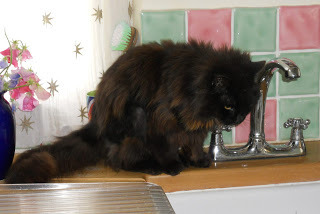 Ooh, bubbles!"We have to decide what sort of writers we are, not merely for the words, but also for how we shall live.
Ooh, bubbles!"We have to decide what sort of writers we are, not merely for the words, but also for how we shall live. Does our curiosity about life stir us into new circumstances and chances to be taken?
Do we let the muse lead us blindly, gladly and madly into the forest of our own imagination, with or without the pen?
Can we see stories in the everyday, and even, perhaps, where there are none?
Will we embrace the stillness and build a whole universe of ideas and emotions around us?
To be a writer is not to be a mere storyteller - children can do that. To be a writer is to make our readers want the fiction to be true, and to linger long after The End. To be a writer is to to make your readers yearn, to care and above all else to read on.
Yes, we have to decide how we live, on the page and away from it.
We should not hide from the big questions of life and death. And if we fear then let us turn our fears into words. Our courage too, aye, and our emptiness.
Above all, let us retain and nurture our sense of wonder, for in writing only wonder sustains."
I know six modern writer words; they show me what to do.
Their names are blog, tweet and redraft, spell-check, contract and sue.
Published on August 04, 2013 00:56
August 1, 2013
We love you, grammar
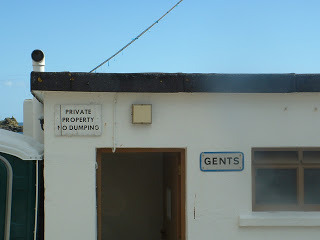 Are they just jerking your chain?I used Grammarly to grammar check this post, because sometimes I don't know my hast from my elbow.
Are they just jerking your chain?I used Grammarly to grammar check this post, because sometimes I don't know my hast from my elbow.We all know that the right words can make the message memorable, whereas the wrong words can make the message memorable too, but for all the wrong reasons.
You could say that the holy trinity of good writing is spelling, punctuation and grammar. Or is it 'one could say'? And then, of course, there's the issue of context - as the image opposite illustrates.*
I sometimes struggle with grammar for several reasons:
1. It wasn't taught at school.
2. Strunk & White will only get you so far.
3. British English and American English are as alike as two essentially similar, but somewhat different peas in proximal pods. (And there's a reason why that particular expression never caught on.)
When it comes to subtle nuances of American English I can often rely on Monika Spykerman, but she isn't always available and refuses to keep UK hours online. So I was intrigued when the folks at Grammarly approached me to test their online product.
It checks for both American English and British English, so here's their evaluation for this post.
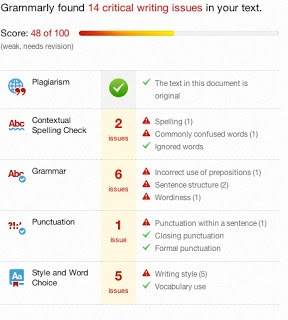 Check please!It looks like I've still got some work to do!
Check please!It looks like I've still got some work to do!* Available for t-shirts and affordable corporate motivational posters everywhere.
Published on August 01, 2013 05:32
July 22, 2013
Feedback Deciphered
By any other name...For those who think sequentially, feel free to consider this post a direct descendant of something I put on Strictly Writing, not so long ago, just for fun.
Rejection can be a bitter pill to take, not least because it isn't always clear what to do next. Oh, sure, you can dive into the Handbook or the Yearbook, but have you ever received a note back from an agent or publisher and wondered exactly what they're trying to say?
Grab a comforting drink and find yourself a comfy space - it's time to break the code...
1. Not one for me this time (because hell hasn't frozen over and we want to stay solvent).
2. Your work shows great promise, however. (Many of the words are spelt correctly and appear in the right order. Well done, you.)
3. Unfortunately I'm unable to give you any feedback (because it's difficult to laugh this much and type at the same time).
4. Our schedule is full for the next year (with real books). (And the year after that I'll do whatever it takes...)
5. However, I'd be interested in seeing your next book. (Go away for a year or so and try to forget about me.)
6. We have a special scheme for new authors. (Do you have any money? We could really use a sponsor.)
7. It's an unusual premise. (Your ideas scare me, or confuse me, or revolt me.)
8. Unfortunately we've recently taken on something similar (only with better ideas and better execution).
9. After careful consideration...(we let the intern decide).
10. It still needs some work. (You've cut corners and it shows.)
11. I hope you won't feel too disappointed by this letter. (I have no concept of how important this is to you.)
12. I wish you every success in finding the right agent or publisher. (Next!)
13. The story failed to come alive on the page. (I want magical pages that sing and dance.)
14. There was insufficient narrative tension and the characterisation wasn't fully realised. (I have an MA and you can't disprove my opinions.)
15. It's not our policy to reconsider previously rejected material. (You again? You may be desperate, but we're not.)
16. This is only my opinion and you may find another agent or publisher who sees your book differently. (I didn't like it - end of story. Someone else might dislike it less.)
About the author
Derek Thompson is a humorist and purveyor of words. Some people mistake that for being an embittered cynic, which is a shame. Especially if they are potential clients. However, if his brand of wit doesn't put you off and you need a writer, drop him a line - he wants to buy some more shiny things.
Rejection can be a bitter pill to take, not least because it isn't always clear what to do next. Oh, sure, you can dive into the Handbook or the Yearbook, but have you ever received a note back from an agent or publisher and wondered exactly what they're trying to say?
Grab a comforting drink and find yourself a comfy space - it's time to break the code...
1. Not one for me this time (because hell hasn't frozen over and we want to stay solvent).
2. Your work shows great promise, however. (Many of the words are spelt correctly and appear in the right order. Well done, you.)
3. Unfortunately I'm unable to give you any feedback (because it's difficult to laugh this much and type at the same time).
4. Our schedule is full for the next year (with real books). (And the year after that I'll do whatever it takes...)
5. However, I'd be interested in seeing your next book. (Go away for a year or so and try to forget about me.)
6. We have a special scheme for new authors. (Do you have any money? We could really use a sponsor.)
7. It's an unusual premise. (Your ideas scare me, or confuse me, or revolt me.)
8. Unfortunately we've recently taken on something similar (only with better ideas and better execution).
9. After careful consideration...(we let the intern decide).
10. It still needs some work. (You've cut corners and it shows.)
11. I hope you won't feel too disappointed by this letter. (I have no concept of how important this is to you.)
12. I wish you every success in finding the right agent or publisher. (Next!)
13. The story failed to come alive on the page. (I want magical pages that sing and dance.)
14. There was insufficient narrative tension and the characterisation wasn't fully realised. (I have an MA and you can't disprove my opinions.)
15. It's not our policy to reconsider previously rejected material. (You again? You may be desperate, but we're not.)
16. This is only my opinion and you may find another agent or publisher who sees your book differently. (I didn't like it - end of story. Someone else might dislike it less.)
About the author
Derek Thompson is a humorist and purveyor of words. Some people mistake that for being an embittered cynic, which is a shame. Especially if they are potential clients. However, if his brand of wit doesn't put you off and you need a writer, drop him a line - he wants to buy some more shiny things.
Published on July 22, 2013 23:30
July 20, 2013
Dark Dates
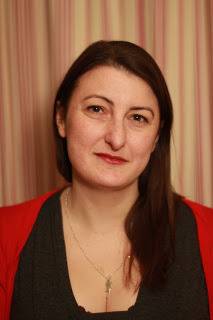 They say you never really know someone until you live with them and I've found that applies to writers as well. By which, I mean, it's only when you spend quality time with them that you begin to understand what makes them tick and what life experiences they're drawing upon.
They say you never really know someone until you live with them and I've found that applies to writers as well. By which, I mean, it's only when you spend quality time with them that you begin to understand what makes them tick and what life experiences they're drawing upon. Sharing a blog like Strictly Writing is a little like being in a relationship of sorts, or maybe a creative commune. We share ideas and anecdotes, as well as excerpts. However, sometimes one of us will post something that's so visceral that it cuts through any intellectualising and brings you to a standstill.
Fellow scribe Tracey Sinclair did just that recently when she blogged about grief and creativity - you can find it hereand I recommend a second reading. You'll also note from the comments we received that Tracey's willingness to share exactly what was going on in her life really touched people.
I caught up with her to find out more about her journey as a writer and how her recent experiences had impacted on her writing practice.
Was it a difficult decision to talk so openly and personally about where your life is right now?
It was and it wasn’t – I have blogged about personal things in my life before so it wasn’t a new thing for me to do, and I do think there is genuine value in sharing these kinds of experiences, but actually writing it and getting it out there was far harder than I thought and felt quite exposing. The reaction I got from people made me glad I did it though, as lots of people got in touch to say they found it inspiring and moving.
Have you found writing to be therapeutic and does this change how you write?
Not therapeutic, no, I don’t think so. I enjoy it and it makes me happy, so that has, I suppose, a therapeutic value, but I’m not one of those people who finds some sort of catharsis through writing.
You have a foot in two writing camps - fiction and copywriting / editing. How do you make time for both?
Part of the reason I became a freelancer was so that I would have more flexibility and be able to fit in more fiction writing. Because I can set my own hours I can adapt my work schedule as needed, and work whenever and wherever I want. Sometimes that does mean working very long hours and every day of the week but I don’t mind – I’m happy to be writing at 2am if that’s what it takes to get something done.
What's next for your main character, Cassandra Bick?
Cass came from a place both of love and frustration – I love the urban fantasy genre but I was sick of the fact that the female characters seemed to fall squarely into two camps, these days: impossibly kick ass lone wolf women or swooning teens, and there didn’t seem to be a place for a woman who you could picture yourself having a drink with, a woman who you can imagine living in the real world and who has friends and a job – someone a bit like me, I suppose, only with a far more interesting love life! I also wanted to write something that reflected modern London (and modern life) so wasn’t just peopled by straight white people. Plus I love writers like Jim Butcher and Joss Whedon who realise that adding humour to something doesn’t devalue it or mean you make it less serious; you can care deeply for characters but still tell a joke, or recognise how ridiculous a situation is. I love the fact that in Dark Dates many of the characters, especially Cass, realise just how insane their lives are and can still make jokes even when things are tough, because that’s how people cope with extreme situations.
In terms of what’s next for her, I honestly don’t know – I have a vague idea of what’s going to happen in the third book, but I won’t know until it’s written, as I tend not to plot too far in advance, I like the story to unfold as I’m writing it. In terms of being affected by my own recent experiences, I don’t think her storyline will be. She’s already lost people and is no stranger to grief so that isn’t a new subject for the books, and I have no plans to shoehorn anything in to write through my own experiences. I imagine all of this upheaval will come out in something, somewhere, but not just yet and I’m not sure these books are the place for it.
What's your process when writing a Cassandra Bick story?
I tend to start with character sketches or short scenes – sometimes funny, sometimes not – that allow me to give ideas a work out then expand that into a handwritten first draft. Sometimes these stem from the fact that I think something would be funny, sometimes just from an idea I had that I’d like to see how it looks written down. I then do another handwritten draft because I think the fact that it’s a laborious process makes me pay more attention and notice mistakes. I rarely build scenes around humour, but I do reread them once they’re done to see if I can puncture any po-facedness, as that’s one of the things I want the books to avoid. I’m with Joss Whedon (again!) on this one, where he said – and I’m paraphrasing because I can’t recall the exact quote – make it as dark as you like, but then for God’s sake, tell a joke.
When and why did you decide to self-publish?
I had two small press titles published in the literary fiction genre, and was struggling to find anyone to take Dark Dates because, apparently, ‘vampires are over’, but it wasn’t the kind of thing my existing publisher would be interested in. So I thought, sod it, and just put the book out there myself, partly because I just got bored of waiting for any progress and I just wanted the first one off my desk. It’s been quite the learning curve – it’s far harder work than you’d think – but I’m glad I did it, as so many people have told me they loved the books and the reviews have generally been excellent, so it makes me feel like I wasn’t deluding myself by thinking they were good!
Where can we find any other interviews?
www.darkdates.orghttp://www.jadekerrion.com/2012/10/08/tracey-sinclair-dark-dates/http://www.book-brats.com/interview-author-tracey-sinclair/
http://traceysinclairconsulting.com/tag/dark-dates/
http://thebooktart.com/new-fiction-release/interview-with-tracey-sinclair-contest/
Where can we find out about your books?
www.darkdates.org
And where can we buy your books?
http://www.amazon.co.uk/Dark-Dates-Cassandra-Chronicles-ebook/dp/B007RH5PF4
http://amzn.to/WQYiwY
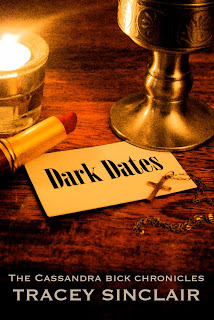
Published on July 20, 2013 08:47
July 18, 2013
The 'about time I wrote something' post
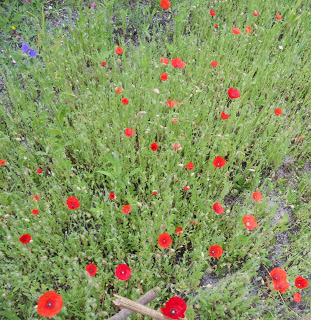 The right conditions + time and effort = something amazing.Well, who'd've thunk it? JK Rowling swallowed some of Hermione's Polyjuice Potion and then emerged from the Hogwarts loos as crime writer Robert Gilbraith.
The right conditions + time and effort = something amazing.Well, who'd've thunk it? JK Rowling swallowed some of Hermione's Polyjuice Potion and then emerged from the Hogwarts loos as crime writer Robert Gilbraith. I'm sure there'll be many writers, struggling to get a foot in the literary door, who will cry 'Foul!' but all credit to her. She could have submitted the book under her own name and would have been assured of a hearty welcome. Instead, she chose to let her work stand or fall on its own merits and that's a brave thing to do when you don't have to.
The story of the story, if you get my meaning, also confirms what writers have long accepted as gospel:
- If the opportunity arises, good writing wins through.
- An agent can make a world of difference.
- Good reviews do not necessarily translate into plentiful sales.
- Not everything is every editor's cup of tea.
- It's been reported that Orion Books turned The Cuckoo's Calling down because, although it was 'perfectly good' it didn't stand out. Depending upon your frame of mind, you could either feel buoyed up or devastated by that!
A couple of my friends have recently been signed to agents and so their journey has moved from 'get an agent' to 'get a deal'. From what they've said, the next stage is very similar to the first; writing, rewriting, submitting (albeit the agent does that), waiting and then jumping every time the phone rings or the inbox pings.
Unless you're a celebrity and something is ghostwritten for you, or you are the conscious reincarnation of Sir Arthur Conan Doyle (feel free to replace with the author of your choice), there are no shortcuts. Because, without every single, faltering and maddening step, there is no development as writers. Put aside, for a moment, all the internet hype about analytics, community, coverage and kudos levels. If you can't write - or worse, you won't write - then you will struggle to become a writer.
Becoming is not a word that's popular these days. it doesn't fit the mould of 'be a successful gymnast in 90 days using our proven technique'. Even Lord Alan Sugar, in the recent final of The Apprentice, commented that business start-ups need to realise that you start at the bottom and work your way up. It's not just the road less travelled, it's the road frequently avoided.
In part, I think, it's why creatives become (yes, I know it's that word) so disillusioned. In a similar to staying online because we're afraid of missing out, we can avoid committing to writing because we want to sidestep the pain of the first draft and the purgatory of the subsequent edits. When we do that, we kill inspiration stone dead. The muse packs his or her bags (I have one of each, currently, and they don't get on) and heads off to someone more appreciative. And then those lovely stories we know we are capable of telling fall silent even in our own heads. Or else they torture us with whispers when we're stuck in traffic or reading someone else's work.
All I'm saying is what everyone who has ever written a book has said: writers write. It's as simple as that. Everything else is a whole other ball of beeswax. There, that ought to do it. Now I can get back to my novel.
Published on July 18, 2013 07:07



